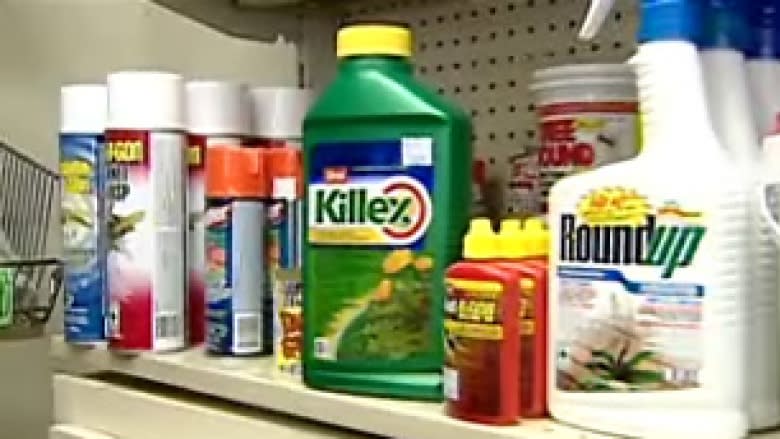Government to weed out pesticides from foreign websites
The federal government is moving to close a loophole that allows Canadians to make legal online purchases of pesticides not registered for use in Canada, and have them shipped into the country.
Right now, if someone buys the pesticides for use in controlling weeds or insects around their own home and doesn't exceed the amount that qualifies for an exemption, there is little that authorities can do to stop the shipment, say government officials.
Part of the problem is the way the exemption contained in the regulations is currently worded. It refers only to where the imported pest-control product would be used — at home versus a commercial or public space — rather than the type of product, Health Canada officials wrote in a notice of the proposed changes to the Pest Control Products Regulations (PCPA).
That means Canadians can legally purchase pest-control products considered to pose an unacceptable risk in Canada, or that require special equipment and training to use safely, as long as they are within the amount covered by the exemption — less than 500 g or 500 ml and under $100 in value.
"As a result, neither Health Canada nor the Canada Border Services Agency (CBSA) has the authority to refuse entry of such products if they meet the exemption criteria," officials wrote.
The current regulations also don't take into account the ease of buying pesticides online, the notice explained.
"The possibility of Internet sales and the potential threats such sales could pose to human health and the environment were not envisaged when the exemption was created in 1972."
Just how many Canadians are turning to the Internet in their quest for a lush, weed-free or bug-free garden is difficult to tell. Those circumventing provincial or municipal pesticide laws to buy products their local garden centre isn't allowed to carry don't tend to advertise the fact.
Pesticide shipments on the rise
Health Canada says it has identified more than 3,000 pest-control products for sale on foreign online retail websites.
The notice says Health Canada believes purchases by Canadians of prohibited pesticides are on the rise.
"Health Canada has noticed that the number of potentially dangerous products being imported has been increasing along with the growth of imports via courier and post," it wrote.
"Products that have been referred to Health Canada by the CBSA from the courier/mail stream include restricted class fumigants as well as various commercial class products intended to be used by licensed applicators with the appropriate training and equipment."
A pilot project at one courier entry point in Ontario between May and September 2015 resulted in 108 packages referred by CBSA to Health Canada and 454 kg of unregistered pest-control products blocked from entering Canada.
The current rules also have no restriction on how many orders someone can place, as long as each order is within the size limit.
"Importers can circumvent the quantity limit set out in the exemption by placing many separate orders via the Internet," officials wrote. "This allows individuals and businesses to import virtually unlimited quantities of unregistered products for possible commercial use or resale — both of which contradict the 'personal use' criterion and intent of the exemption."
Shipping potentially dangerous pest control products into the country can also be a safety risk for those who handle it along the way — from warehouse employees and postal workers to border services officers, the government added.
The fix
Under the changes the government is proposing, pesticides ordered online could be stopped at the border because new rules will require individuals to have the chemicals in their personal possession in order to bring them into the country.
A further restriction, the pesticide would also have to be equivalent to a domestic class product already authorized for sale in Canada.
The total quantity could not exceed 500 g or 500 ml per person and per package, preventing people from claiming they are combining their exemptions in order to bring a larger package into the country.
Any imported pesticide must also be an authorized product in its country of origin. Under the current rules, there is nothing to stop someone from bringing into Canada a product not approved for use in the country where it's made.
The pesticide would also have to be in its original packaging and the labels must include at least one of Canada's official languages to allow Canadian officials to read and understand them.
However, even if Canadians will still be able to bring some pesticides into the country, it doesn't mean that they will be able to legally use them in every province. For example, under the Ontario Pesticides Act, residents can't use pesticides that aren't classified for use in Ontario, said Gary Wheeler, spokesman for Ontario's environment ministry.
Wheeler said the federal government's move to tighten the regulations will help Ontario's efforts to control the use of banned pesticides.
Some provinces, however, like British Columbia, Saskatchewan and Alberta, have few restrictions on pesticide use.
Problem is much larger
Dr. Warren Bell of the Canadian Association of Physicians for the Environment said the proposed regulations don't address the much bigger problem — the federal government continues to authorize products like Round Up that contain glyphosate, which some research has linked to cancer and kidney disease.
He said the proposed changes are "sort of like the little Dutch boy putting his finger in the hole in the dike when there are 50 holes already there."
Shannon Coombs, president of the Canadian Consumer Specialty Products Association, whose members include companies that make domestic pesticides, said her association supports "effective, fair and enforceable" regulation, but is not yet convinced the proposed changes will stop pesticides bought online at the border.
"There are references to Internet sales throughout the document, but it is unclear on how Health Canada and CBSA will be successful in this prohibition."
Canadians have until mid-March to send their views to the government. The changes would then go into effect six months after they are published in the Canada Gazette.
Elizabeth Thompson can be reached at elizabeth.thompson@cbc.ca





